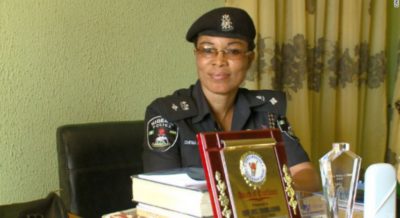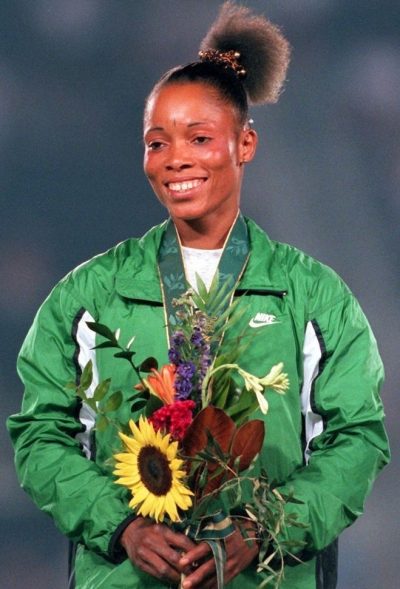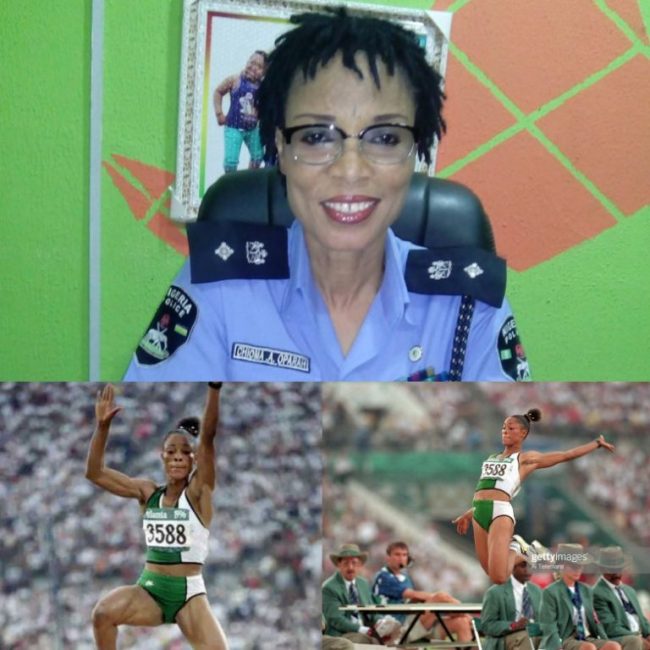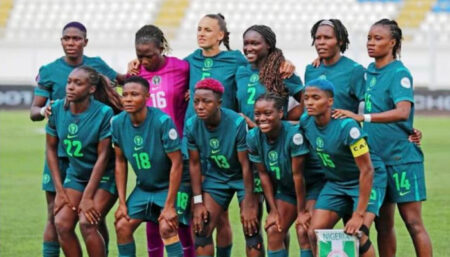When in 1992 Chioma Ajunwa decided to wave goodbye to her first love, football, little did she know that her next love, track and field, would provide the platform for her to achieve the greatest feat of her career in sport.
She began playing football from her secondary school days and didn’t for once think she would ever race on the track.
“It was coach Onyali of Spartans of Owerri that advised that I could be a good sprinter because of my speed. That was when I also started doing track and field. I was still very active playing football but got my first gold medal in track and field at the 1991 African Games in Cairo, Egypt (she won the long jump gold and was a member of the 4x100m relay team that struck gold at the event). A year earlier I was in the Nigerian team to the third edition of the IAAF World Junior Championships in Plovdiv, Bulgaria where I finished fifth (6.46m) in the long jump,” recalls Ajunwa.
When the Super Falcons qualified for the inaugural edition of the women’s football World Cup in 1991, it was an extremely proud moment for the team and the country at large. However, for Ajunwa it was also a frustrating experience, as she spent most of the tournament sitting on the substitutes’ bench.
“I was injured before the start of the tournament but because of my versatility, our coach then,(Johannes) Bonfrere ensured I featured albeit we lost all our three group games to crash out,” she recalls.
After the experience at the FIFA World Cup, Ajunwa was frustrated out of the team by the coach who succeeded Bonfrere as Super Falcons coach.

“The coach told me I had no chance in his team. He didn’t want me to combine track and field with football. When he started overlooking me in his selections, I thought it was time to move on. It was at that stage I decided to quit playing football permanently to concentrate on track and field.”
Ajunwa had already demonstrated her prowess as a good track and field athlete, specialising in both the 100m and the long jump. In March 1992 at the National Stadium in Surulere, Lagos she leapt a distance of 6.90m to set a new African record in the long jump.
After the World Cup, she channelled all of her energies into these two events and her progress was exponential.
She went on to represent Nigeria in both, but it was the 100m that she felt offered her best prospects of a medal at the 1996 Games. In fact, she didn’t even know that she had been entered into the long jump until she arrived in Atlanta!
‘Yes,I thought I was doing only the 100m and of course the 4x100m relays. At the National Trials I jumped 6.65m and the standard set by the AFN was 6.86m or close to it. Since I couldn’t make the standard and didn’t know about the standard set by the IAAF (now World Athletics) for the event, I assumed my chances of jumping in Atlanta were almost zero. In fact, Chief Segun Odegbami didn’t want me to jump at the trials after I sustained an injury..he kept shouting that was enough Chioma.
“But when I got to Atlanta, Alhaji A.K Amun told me that I had been registered for the event. I asked how? He said I met the standard for the event set by the world governing body, World Athletics,” said Ajunwa who had to change her training programme at that stage.
“During training some of the coaches around were amazed by what I was doing and told my coach I could win the gold medal!. It wasn’t enough though to make me believe.”

In the 100m, she made the semi-finals but further progress was halted by the narrowest of margins, as she placed fifth following a photo-finish, despite running the same time (11.14 seconds) as the athlete who came fourth (Zhanna Pintusevich of Ukraine) in the first of two semifinals.
Ajunwa went into the long jump with little expectation. Yet in the qualifying round she proved to be a revelation, jumping 6.81m to place second and stormed into the following evening’s final. It was as if she had absolutely no nerves. Her first leap in the final saw Ajunwa soar 7.12m to set an intimidating benchmark for everyone else to chase. It was the biggest jump of her career – a distance she would never again match. And in the course of the next six rounds in Atlanta no other athlete could match it either. The closest was then reigning World Champion Fiona May who jumped 7.02m in her second attempt and USA’s Jackie Joyner-Kersee who waited till her sixth and final attempt to hit the 7m mark.
Ajunwa became Nigeria’s first Olympic champion ever and the first African to win a field event.
Also Read – Onyali Relives Olympic Glory: ‘I Wanted Two Medals At Atlanta’96 But Got Only One’
“That was the greatest jump of my sporting career. I am most grateful to God for it,” she told Complete Sports.
Her attempt to make further history as the first Nigerian nay African woman to win an Olympic and World Championships gold medal was thwarted by injury in Athens, Greece at the 6th IAAF World Championships the following year. The hamstring injury stopped her from leaping into history books again.
“I remember very vividly what happened in Athens. I led the qualifiers as it were with my 7.00m jump and all eyes were on me to see if I could repeat my Atlanta ’96 feat. Remember also that I lost the World Indoor gold to Fiona May in the winter of that year and I was determined to prove my victory in Atlanta was not by happenstance. But injury didn’t allow me and Lyudmila Galkina of Russia won with 7.05m.”
Ajunwa was also in the Nigeria’s 4x100m team in Atlanta. She ran the opening leg as the quartet of herself, Mary Tombiri, Christy Opara-Thompson and Mary Onyali came fifth in a new 42.56 seconds African record.
By Dare Esan








1 Comment
It was a proud moment for the nation backed up by the footballers winning gold too. Atlanta 96 remains our best ever olympic return. We can do better.